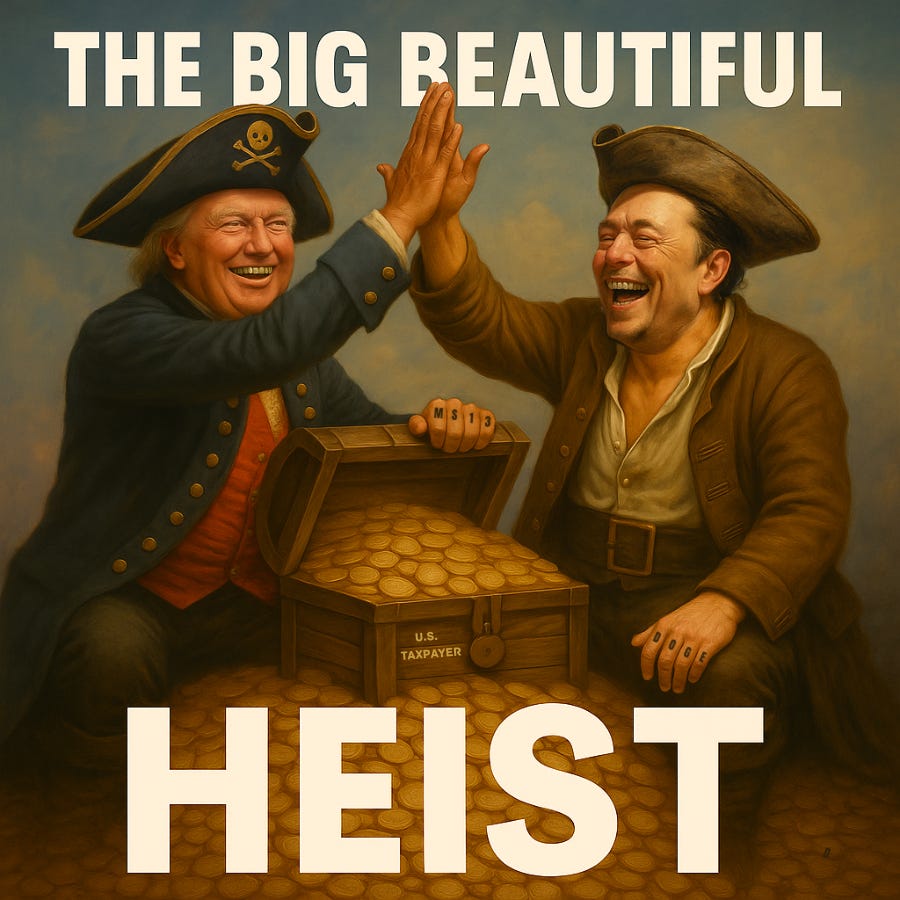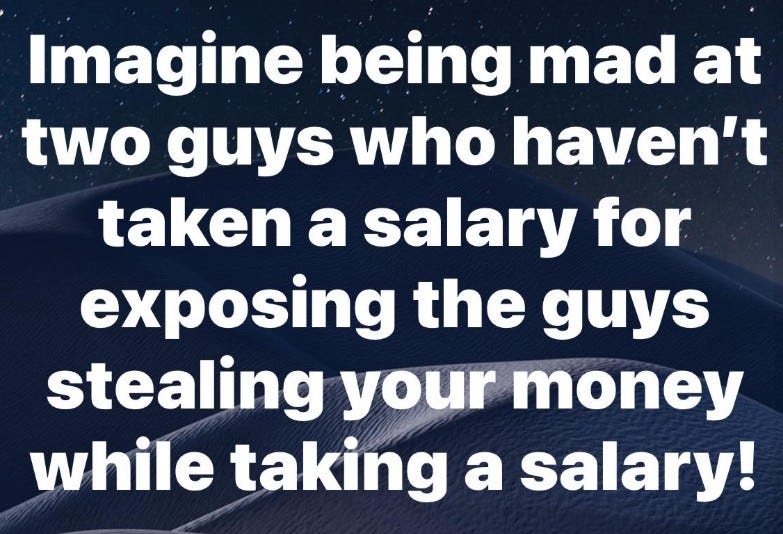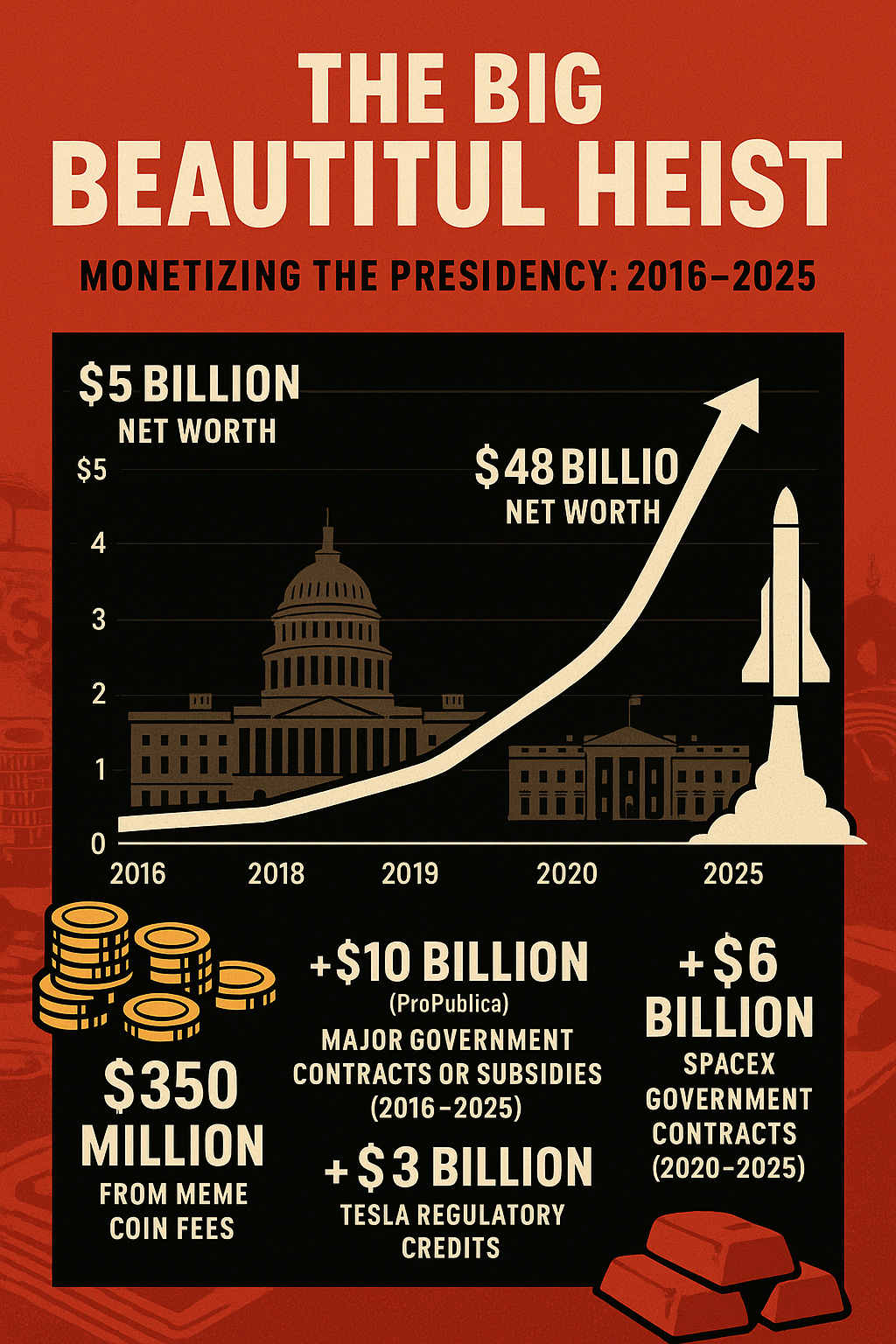The Big Beautiful Heist: Trump, Musk, and the Billion-Dollar Grift
When Billionaires Play Victim and the Poor Say Amen
What A Loved One Shared
This morning, like so many mornings before it, I opened my phone to find my social media feed flooded with the usual propaganda. But one image stopped me cold—a meme that crystallized everything wrong with this moment in American history. It read: "Imagine being mad at two guys Trump and Musk who haven't taken a salary for exposing the guys stealing your money while taking a salary."
Within hours, a loved one had shared it. So had countless others—good people, decent people, people who work hard and pay their taxes and want desperately to believe that someone, somewhere, is fighting for them. People who have been so betrayed by the system that they will embrace any narrative, no matter how preposterous, that promises them heroes instead of more disappointment.
There is something deeply American about the way we create our myths, and something even more American about the way we cling to them long after the truth has made itself plain. For nearly a decade now, we have been asked—no, commanded—to believe a story so preposterous that it would be laughable if it were not so dangerous. The story goes like this: Donald Trump and Elon Musk, two of the wealthiest men in human history, have sacrificed their comfort, their fortunes, their very peace of mind, all for love of country and concern for the common man.
This is the narrative that echoes through cable news studios and reverberates across social media feeds, painted in the broad strokes of martyrdom and persecution. These men, we are told, are victims—hounded by a corrupt system for daring to challenge the established order, selfless patriots who set aside personal gain to serve the American people. The faithful repeat this gospel with the fervor of true believers, as if repetition alone could transform fiction into fact.
But I have lived long enough to know that when rich men speak of sacrifice, when powerful men claim victimhood, when those who feast at the table of power insist they are starving for the people—it is time to examine the books. And the books, dear reader, tell a story that would make even the most hardened cynic blush with embarrassment for having underestimated the audacity of it all.
Donald Trump: The Alchemy of Public Office
The Sacred Theater of the Forfeited Salary
Let us begin with the most sacred piece of this mythology: Donald Trump's decision to forgo his $400,000 presidential salary. How many times have we heard this figure invoked, this supposed proof of selfless service? How many speeches, how many rallies, how many late-night social media posts have elevated this gesture to the status of holy writ?
But here is what they do not tell you in those speeches, what gets lost in the righteous indignation and the claims of persecution: while Trump was performing this theater of sacrifice, his businesses were conducting the most successful money-laundering operation in the history of American politics. Not laundering dirty money, mind you, but laundering dirty politics into clean profit.
According to Forbes—no bastion of liberal conspiracy—Trump's businesses raked in over $2.4 billion during his first term alone. Government officials became regular customers at Trump hotels. Foreign dignitaries found themselves inexplicably drawn to Trump golf courses. Lobbyists discovered that Mar-a-Lago memberships had become, quite suddenly, essential to their work. The presidency itself had become a marketing campaign, and every day in office was a commercial for the Trump brand.
That $400,000 salary he so generously forfeited? It was not sacrifice; it was the best investment he ever made. Every dollar he declined was transformed into six thousand dollars of business revenue. This is not patriotism; this is alchemy.
The Monetization of Memory
But if you thought the grift ended when Trump left office, then you have not been paying attention to the American capacity for turning everything—even failure, even disgrace—into profit. The post-presidency years have been, if anything, more lucrative than the presidency itself. Paid speeches have brought in millions. Media deals have fattened already substantial bank accounts. Digital trading cards—NFTs, they call them, as if the acronym somehow makes the absurdity more palatable—have generated tens of millions more.
And then came the masterstroke, the piece de resistance of this grand performance: the $TRUMP meme coin. Launched in the wake of his 2024 campaign, riding the wave of political fervor like a surfer catching the perfect storm, this digital currency has generated over $350 million in fees alone since his re-election.
Think about that number for a moment. Let it settle in your mind like sediment in still water. Three hundred and fifty million dollars—more money than most people could spend in several lifetimes—extracted from the very people who believe he is sacrificing for them. This is not governance; this is not service; this is not even capitalism in any recognizable form. This is something else entirely, something that would make P.T. Barnum himself tip his hat in grudging admiration.
The American Tradition of Gilded Saints
But before we turn our attention to Musk, let us pause to acknowledge that this story is not new. America has always had a peculiar relationship with its wealthy men, a tendency to canonize those who accumulate the most while claiming to sacrifice the most. The robber barons of the Gilded Age built libraries and universities while their workers died in industrial accidents. The oil tycoons of the early 20th century funded charities while poisoning rivers.
Yet even some of those men—rapacious as they were—possessed something that Trump and Musk seem to lack entirely: moral introspection. Andrew Carnegie struggled genuinely with the contradictions of his wealth, writing extensively about the moral obligations of the rich. He called great fortunes a "sacred trust" and gave away 90% of his wealth. In our own time, Bill Gates has pledged to give away most of his fortune, stating recently that he considers it a moral imperative to use his wealth to address global suffering.
Carnegie understood, however imperfectly, that great wealth carried great responsibility—that accumulation without contribution was a form of moral bankruptcy. He felt the weight of his contradictions and attempted to reconcile them.
What is new is the brazenness, the sheer audacity of the performance we witness today. What is new is the way that the very act of self-enrichment has been rebranded as public service, the way that personal profit has been transformed into patriotic duty. What is new is the complete absence of moral struggle, the utter lack of introspection, the transformation of greed from a vice to be overcome into a virtue to be celebrated. What is new is men like Elon Musk.
Elon Musk: The Gospel of Self-Made Mythology
The Subsidy King's Crown
If Trump is the master of personal branding, then Elon Musk is the virtuoso of public relations mythology. We are asked to see him as the embodiment of American innovation, the rugged individualist leading humanity boldly into the future. He is Iron Man made flesh, the genius entrepreneur who dares to dream of Mars while the rest of us are stuck thinking about quarterly reports.
But strip away the mythology, examine the ledger books, and a different picture emerges—one that should make every American taxpayer sit up and pay attention. This is a man who began his American journey by gaming the immigration system itself, falsely claiming enrollment at Stanford University for nearly two years while working illegally on a student visa. Even then, Musk understood that rules were suggestions, that systems existed to be exploited rather than respected.
Since 2016, Musk's empire—Tesla, SpaceX, Starlink—has gorged itself on over $10 billion in direct subsidies, contracts, and tax breaks. Ten billion dollars. That is not a subsidy; that is a way of life. Tesla alone has netted more than $3 billion from the sale of regulatory credits—a government program that essentially pays Tesla for making electric cars that other companies are required by law to buy credits for. SpaceX, meanwhile, has secured over $6 billion in NASA and Pentagon contracts since 2020. Far from being the rugged individualist of popular imagination, Musk has revealed himself to be one of the most successful welfare recipients in American history.
The irony is breathtaking: the same man who violated immigration law to establish his foothold in America now champions mass deportations. The same man who built his fortune on government largesse now advocates for slashing social safety net programs that help working families survive. It is not hypocrisy; it is something far more calculated—the systematic pulling up of ladders after one has climbed them.
The Capture of Democracy Itself
But Musk's genius—and make no mistake, it is a form of genius, albeit a perverse one—extends beyond mere financial manipulation. Since 2023, he has engaged in what can only be described as the systematic capture of the regulatory apparatus meant to oversee his companies. Former company executives have been installed in key federal positions with the regularity of a corporate reorganization.
The result? SEC investigations into Tesla's accounting practices have been quietly shelved. NHTSA safety inquiries have evaporated like morning mist. The very agencies meant to protect the public from corporate excess have been transformed into protective services for Musk's expanding empire. His companies now operate with fewer checks and balances than a small-town lemonade stand, their growth fueled by public money and shielded by political influence.
The "Big Beautiful Bill": A Monument to Shamelessness
Just months into his 2nd term, President Trump promoted what he called the "Big Beautiful Bill"—a federal tax and spending bill that includes extended tax cuts, stricter eligibility requirements for federal benefits, and a dramatic increase to the national debt.
But examine the fine print—as so few Americans ever do—and the familiar pattern emerges once again. Billions upon billions of dollars have been earmarked for projects that disproportionately benefit Trump donors and Musk's companies. The irony is so thick you could cut it with a knife: the bill's largest beneficiaries are the very billionaires who have built their political brands on the promise of draining the swamp.
They have not drained the swamp, friends. They have simply built a bigger, more profitable one, with themselves as the primary inhabitants and the American taxpayer as the unwitting benefactor.
The Weight of Willful Blindness
And so we return to that meme, the one a loved one shared this morning, the one that reduces this vast con game to a simple morality tale of good guys and bad guys. "Imagine being mad at two guys Trump and Musk who haven't taken a salary for exposing the guys stealing your money while taking a salary."
I think about the person who shared it when I see such things—about a generation that lived through times when a handshake meant something, when a man's word was his bond, when public service carried with it at least the pretense of sacrifice. I think about how desperate they must be for heroes, how tired they must be of being disappointed, how ready they are to believe that someone, somewhere, is finally fighting for people like them.
But here is what that meme does not tell them, what gets lost in the comforting simplicity of its message: the men they are defending have not forfeited anything except the pretense of serving anyone other than themselves. They have not exposed the thieves; they have simply perfected the theft.
Let me be clear about what I am not saying. I am not suggesting that either Trump or Musk is stupid, or incompetent, or accidentally successful. Quite the opposite. What we are witnessing is a masterclass in the manipulation of democratic institutions, a clinic in the art of transforming public service into private profit. It is brilliant in its way, as brilliant as it is morally bankrupt.
What I am saying is this: the numbers do not lie, even when everything else does. The ledgers do not care about mythology or political loyalty or the desperate human need to believe that our heroes are actually heroic. Donald Trump and Elon Musk have not sacrificed anything for this nation except the pretense of serving anyone other than themselves.
Trump's business revenue from 2016 to 2025 has exceeded $2.4 billion, according to Forbes. His meme coin has generated over $350 million in fees in 2025 alone. Musk's companies have received more than $10 billion in government subsidies and contracts since 2016, with Tesla collecting over $3 billion in regulatory credits and SpaceX securing more than $6 billion in government contracts since 2020. These are not opinions or partisan talking points; these are facts, as solid and immutable as the Washington Monument.
The next time someone tells you that these men are victims, that they are sacrificing for the nation, that they are being persecuted for their patriotism—ask them to explain the numbers. Ask them to reconcile the mythology with the mathematics. Ask them why men who claim to be giving up everything keep getting richer and richer and richer.
Because in the end, that is what this is really about: not politics or patriotism or the future of America, but the oldest and most American story of all—the story of how to separate a fool from his money while convincing him you are doing him a favor.
A loved one shared that meme because they want to believe in heroes. But the men they are celebrating have turned that faith itself into profit, that hope into their dividend, that trust into their treasure.
And if that is not a heist, then I do not know what is.
Key Numbers:
Trump's business revenue (2016–2025): $2.4 billion+ (Forbes)
Trump's $TRUMP meme coin fees (2025): $350 million+
Musk's government subsidies and contracts (2016–2025): $10 billion+ (ProPublica)
Tesla regulatory credits: $3 billion+
SpaceX government contracts (2020–2025): $6 billion+ (WSJ)
"Big Beautiful Bill" new spending: Record increases, with billions flowing to connected interests (CBO, news summaries)





